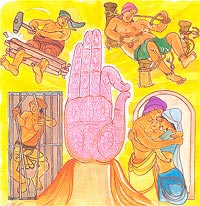09/12/12
Filed under:
General
Posted by:
site admin @ 1:21 pm
13912 Thursday LESSON 699 - மூன்று கூடைகள் திபிதக TIPITAKA from FREE ONLINE eNālāndā Research and Practice UNIVERSITY through http://sarvajan.ambedkar.org
TIPITAKA from FREE ONLINE eNālāndā Research and Practice UNIVERSITY through http://sarvajan.ambedkar.org
Sutta Piṭaka
மதிய திரள் மஜ்ஜிம நிகாய Majjhima Nikāya
முழு சரம்
(புத்தசமய புனித நூ லின் ஒரு
பாகம்) ஸப்பாஸவ ஸுத்தா Sabbāsava Sutta
(MN 2)
Please watch:
http://www.youtube.com/watch?v=iSwDrWENbQI
for
In HD - San Diego 2012 MN 2 All the Taints -
Sabbāsava Sutta
Dhammapada Verses 345 and 346 Bandhanagara Vatthu -Verse 345. Bonds Of Attachment-Verse 346. Bonds Are Strong, But The Wise Get Rid Of Them
>> Tipiṭaka >> Sutta Piṭaka >> Majjhima Nikāya
முழு சரம்
(புத்தசமய புனித நூ லின் ஒரு
பாகம்) ஸப்பாஸவ ஸுத்தா
மிக சுவாரசியமான
சரம், மன தை
நுரைகொள்விக்கிற வேறுமாதிரியான வழிவகை ஆசூச(புனிதத்த்னமையைக் கெடுத்தல்) நிவாரணம்.
Sabbāsava Sutta
(MN 2) - enhanced ATI
Very interesting sutta, where
the different ways by which the āsavas, fermentating defilements of the mind,
are dispelled.
Pāḷi
பாளி
ஏவங் மே ஸுத்தங்: ஏகங் ஸமயங்.
பகவா ஸாவத்யங் விஹாரதி ஜேதவனே
அனாதபிண்டிகஸ்ஸ ஆராமே. தத்ர
கோ
பகவா
பிக்கு ஆமனதெஸி:
Evaṃ me sutaṃ: ekaṃ samayaṃ bhagavā
sāvatthiyaṃ viharati jetavane anāthapiṇḍikassa ārāme. Tatra kho bhagavā
bhikkhū āmantesi:
-பிக்காவோ‘தி.
|
English
தமிழ்
நான் கேட்டுக்கொண்டிருந்தேன்: ஓர் சமயம்
பகவான்
ஸாவத்தியில் அனாதபிண்டிகவின் ஜேதவன விஹாரதில் தங்கியிருந்தார். அவ்விடம் ,
பகவான் பிக்குகளிடத்தில் உரை நிகழ்த்தினார்:
English
I have heard that on one occasion the Blessed
One was staying at Savatthi, in Jeta’s Grove, Anathapindika’s
monastery. There he addressed the monks: தமிழ்
தமிழ்
-பிக்குகளே.
English
|
|
– ‘bhikkhavo’ti.
- ‘பந்தே‘தி தே பிக்கு பகவதோ பச்சஸ்ஸோஸுங். பகவா எததவொச:
– ‘Bhadante’ti te bhikkhū bhagavato paccassosuṃ. Bhagavā etadavoca:
-‘ஸப்பாஸவஸங்வரப்பரியாயங்
வோ பிக்காவே, தெஸஸ்சாமி. தங் ஸுன்னாத, ஸாதுக்கங் மனஸி கரோதா, பாஸிஸ்ஸாமி’தி.
|
– Monks!
தமிழ்
- அப்படியே ஆகுக ‘பந்தே’ என பிக்குகள்
பிரதிபலிலித்தனர். பகவான் சொற்றார்:தமிழ்
English
– Yes, lord, the monks
responded. The Blessed One said:
தமிழ்
-‘முழு
நொதித்தல்களுக்கும், பிக்குகளே,
பரியாயங் கள் போதிப்பேன். தாங்கள் உன்னித்து கேளுங்கள்.
நான் போதிப்பேன்.
English
|
|
– ‘Sabbāsavasaṃvarapariyāyaṃ vo, bhikkhave, desessāmi. Taṃ suṇātha,
sādhukaṃ manasi karotha, bhāsissāmī’ti.
|
– Monks, I will teach you the
method for the restraint of all fermentations.
Listen & pay close attention. I will speak.
தமிழ்
|
|
-‘ ஏவங்,
பந்தே‘தி கோ தே பிக்கு பகவதோ
பச்சஸ்ஸோஸுங். பகவா எததவொச:
– ‘Evaṃ, bhante’ti kho te bhikkhū
bhagavato paccassosuṃ. Bhagavā etadavoca:
- ஜாந்தோ
அஹங், பிக்காவே, பஸ்ஸதோ ஆஸவானங்
காயங் வதாமி, நோ அஜானதொ நோ அபஸ்ஸதொ. கின்சா, பிக்காவே, ஜாந்தோ கின்சா பஸ்ஸதோ ஆஸவானங்
காயங் வதாமி? யோனஸி ச கொ மானஸிகாரங் அயோனஸி
ச கொ பொருத்தமான
கவனிப்பு மானஸிகாரங். அயோனஸிகொ, பிக்காவே,
மானஸிகரோதொ அனுப்பன்ன சேவ ஆஸவா உப்பஜ்ஜன்னதி, உப்பன்னா ச ஆஸவா பவத்தந்தி: யோனஸி
ச கொ, பிக்காவே, மானஸிகரோதொ அனுப்பன்ன சேவ ஆஸவா ந உப்பஜ்ஜன்னதி, உப்பன்னா ச ஆஸவா பஹியந்தி.
|
-‘ அப்படியே ஆகுக ‘பந்தே’ என பிக்குகள்
பிரதிபலிலித்தனர். பகவான் சொற்றார்:
English
– As you say, sir, the monks
replied. The Blessed One said:
தமிழ்
-நான் போதிப்பேன், பிக்குகளே, நொதித்தல்களின்
இறுதி ஞானமுள்ளவருக்கு (அறிந்தும் மற்றும் பார்க்கவும்
முடிந்தவருக்கு) மற்றும் ஞானமில்லாதவருக்கு (அறிந்தும் மற்றும் பார்க்கவும்
முடியாதவருக்கு) அல்ல, பிக்குகளே, யாருக்கு
எதை அறிந்துக்கொண்டு மற்றும் எதை பார்த்துக்கொண்டு? பொருத்தமற்ற
கவனிப்பு. எப்பொழுது
ஒரு பிக்கு பொருத்தமற்று கவனிக்கிறாரோ
எழும்பாத நொதித்தல்கள்
எழும்புகிறது, மற்றும் எப்பொழுது ஒரு பிக்கு பொருத்தமாக கவனிக்கிறாரோ எழும்பாத
நொதித்தல்கள் எழும்புவதில்லை, மற்றும் நொதித்தல்கள் கைவிடப்படுகிறது.
English
|
|
– Jānato ahaṃ, bhikkhave, passato
āsavānaṃ khayaṃ vadāmi, no ajānato no apassato. Kiñca, bhikkhave, jānato
kiñca passato āsavānaṃ khayaṃ vadāmi? Yoniso ca manasikāraṃ ayoniso ca
manasikāraṃ. Ayoniso, bhikkhave, manasikaroto anuppannā ceva āsavā uppajjanti,
uppannā ca āsavā pavaḍḍhanti; yoniso ca kho, bhikkhave, manasikaroto
anuppannā ceva āsavā na uppajjanti, uppannā ca āsavā pahīyanti. .
அத்தி, பிக்காவே, ஆஸவா தஸ்ஸனா
பஹாத்தப்பா அத்தி ஆஸவா ஸம்வரா பஹாத்தப்பா, அத்தி
ஆஸவா அதிவாஸனா பஹாத்தப்பா,
அத்தி ஆஸவா பரிவஜ்ஜனா பஹாத்தப்பா,
அத்தி ஆஸவா வினோதனா பஹாத்தப்பா,
அத்தி ஆஸவா பாவனா பஹாத்தப்பா
|
– Monks,
the ending of the fermentations is for one who
knows & sees, I tell you, not for one who does not know & does not
see. For one who knows what & sees what? Appropriate attention &
inappropriate attention. When a monk attends inappropriately, unarisen fermentations
arise, and arisen fermentations increase. When
a monk attends appropriately, unarisen fermentations
do not arise, and arisen fermentations
are abandoned.
தமிழ்
அவ்விடத்தில், பிக்குகளே, பார்பதால் கைவிடப்படவேண்டிய
நொதித்தல்கள் அடக்கிவைக்கவேண்டியதை
கைவிடப்படவேண்டிய, உபயோகிக்கவேண்டியதை
கைவிடப்படவேண்டிய, சகிப்புத்தன்மைகாட்டவேண்டியதை
கைவிடப்படவேண்டிய, தவிர்க்கவெண்டியதை
கைவிடப்படவேண்டிய, அழிக்கவெண்டியதை
கைவிடப்படவேண்டிய, மற்றும் உருத்துலக்கல்களை கைவிடப்படவேண்டியதை.
English
|
|
Atthi, bhikkhave, āsavā dassanā
pahātabbā, atthi āsavā saṃvarā pahātabbā, atthi āsavā paṭisevanā pahātabbā,
atthi āsavā adhivāsanā pahātabbā, atthi āsavā parivajjanā pahātabbā, atthi
āsavā vinodanā pahātabbā, atthi āsavā bhāvanā pahātabbā.
|
There are fermentations to be
abandoned by seeing, those to be abandoned by restraining, those to be
abandoned by using, those to be abandoned by tolerating, those to be
abandoned by avoiding, those to be abandoned by destroying, and those to be
abandoned by developing.
|
please watch:
http://www.rtbot.net/Majjhima
http://wisdomthroughmindfulness.blogspot.in/2011_08_01_archive.html
http://zomobo.net/middle-length-discourses




 |
Verse 345. Bonds Of Attachment
Neither of iron nor wood nor hemp
is bond so strong, proclaim the wise,
as passion’s yearn for sons, for wives,
for gems and ornaments.
Explanation: The yearning for sons and wives are a stronger
attachment than all the physical bonds made of iron, wood or hemp.
Therefore, consider how to deal with this basic desire with wisdom.
|
 |
Verse 346. Bonds Are Strong, But The Wise Get Rid Of Them
That bond is strong, proclaim the wise,
down-dragging, pliable, hard to lose.
This passion severed, they wander forth
forsaking sensual pleasures.
Explanation: The wise agree that this is a strong bond. It
tends to deprave. Though this seems a lax knot, it is difficult to
untie it to be free. However difficult the process is, freeing themselves
from yearning for sensual pleasures, the wise leave household life
and become ascetics.
|
Dhammapada Verses 345 and 346
Bandhanagara Vatthu
Na tam dalham bandhanamahu dhira
yadayasam darujapabbajanca
sarattaratta manikundalesu
puttesu daresu ca ya apekkha.
Etam dalham bandhanamahu dhira
oharinam sithilam duppamuncam
etampi chetvana paribbajanti
anapekkhino kamasukham pahaya.
Verses 345 & 346: The wise do not say that bonds made of iron, of wood,
and of hemp are strong bonds; they say that only passionate attachment to and
care for gems and jewelry, children and wives are strong bonds. These drag one
down (to lower planes of existence) and although they seem yielding are
difficult to unfasten. The wise, cutting off this bond (of craving) and
resolutely giving up sensual pleasures, renounce the world.
The Story on Imprisonment
While residing at the Jetavana monastery, the Buddha uttered Verses (345) and
(346) of this book, with reference to some thieves who were kept in chains.
One day, thirty bhikkhus came into Savatthi for alms-food. While they were on
their alms-round, they saw some prisoners being brought out with their hands and
legs in chains. Back at the monastery, after relating what they had seen in the
morning, they asked the Buddha whether there were any other bonds stronger than
these. To them the Buddha answered, “Bhikkhus! These bonds are nothing
compared to those of craving for food and clothing, for riches and for family.
Craving is a thousand times, a hundred thousand times stronger than those
chains, hand-cuffs and cages. That is the reason why the wise cut off craving
and renounce the world and enter the Order of the bhikkhus.”
Then the Buddha spoke in verse as follows:
Verses 345 & 346: The wise do not say that bonds
made of iron, of wood, and of hemp are strong bonds; they say that
only passionate attachment to and care for gems and jewelry, children
and wives are strong bonds. These drag one down (to lower planes of
existence) and although they seem yielding are difficult to unfasten.
The wise, cutting off this bond (of craving) and resolutely giving up
sensual pleasures, renounce the world.
|
VOICE OF SARVAJAN
Three old men went to
see God.
The first old man, an American, asked God when will his country come out of
recession. “100 years,” God said.
The American started weeping profusely. “I will not live to see that day”
Second man, a Russian asked God “When will my country become prosperous?”
“Fifty years,” came the reply.
Russian too started weeping profusely. “I will not live to see that day”
Finally the Idiot Against Constitution asked God, “When will my country
become
corruption-free?”
God started weeping profusely. “I will not live to see that day”
![]() TIPITAKA from FREE ONLINE eNālāndā Research and Practice UNIVERSITY through http://sarvajan.ambedkar.org
TIPITAKA from FREE ONLINE eNālāndā Research and Practice UNIVERSITY through http://sarvajan.ambedkar.org 




